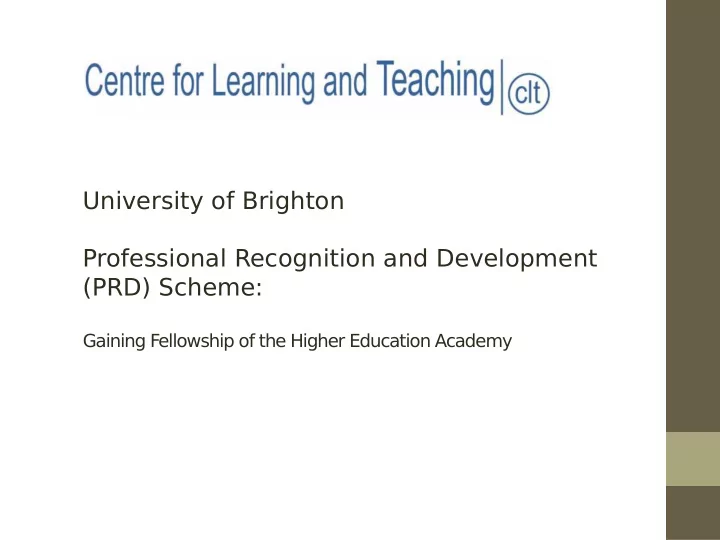

University of Brighton Professional Recognition and Development (PRD) Scheme: Gaining Fellowship of the Higher Education Academy
Further informatjon: Contact John Canning j.canning@brighton.ac.uk htups://stafg.brighton.ac.uk/clt/PD/Pages/Accredited/PRD-Scheme.aspx
University of Brighton Professional Recognition and Development (PRD) Scheme Aims for this briefjng: • T o explain the Scheme and the requirements for submitting an application • T o help you decide which category of fellowship is appropriate to your experience and circumstances • T o direct you towards the appropriate resources and workshops to support your application
UoB’s overall CPD framework • T aught courses (for those new to teaching in HE) • The Professional Recognition and Development Scheme (for supporting all 4 categories of Higher Education Academy fellowship) • CPD workshops to support a range of academic roles: • course leadership • writing for academic publication • supervising students • module/curriculum design • blended learning
University of Brighton PRD Scheme: what and why? • Gain recognition for your expertise in teaching and supporting learning • Mapped against the UK Professional Standards Framework • Accredited by the Higher Education Academy (HEA) • Gain a category of fellowship of the HEA • Engage in CPD
UKPSF: what is in it? Dimensions of practice: set of statements outlining the: • Areas of Activity undertaken by teachers and supporters of learning within HE • Core Knowledge that is needed to carry out those activities at the appropriate level • Professional Values that someone performing these activities should embrace and exemplify Descriptors: set of statements outlining the key characteristics of someone performing four broad categories of typical teaching and learning support roles within Higher Education.
Core Knowledge UK Professional K1 The subject material Standards Framework The K2 Appropriate methods Dimensions Areas of Activity for teaching and learning of Practjce A1 Design & plan learning in the subject area and at activities and/or the level of the academic programmes of study programme Professional Values V1 Respect individual A2 T each and/or support K3 How students learn, learners and diverse learning both generally and within learning communities their subject/ A3 Assess and give disciplinary area(s) V2 Promote participation in feedback to learners higher education and K4 The use and value of equality of opportunity for A4 Develop efgective appropriate learning learners learning environments and technologies approaches to student V3 Use evidence-informed support and guidance K5 Methods for approaches and the evaluating the outcomes from research, A5 Engage in continuing efgectiveness of teaching scholarship and continuing professional development professional development in subjects/disciplines and K6 The implications of their pedagogy, quality assurance and V4 Acknowledge the wider incorporating research, quality enhancement for context in which higher scholarship and the academic and education operates evaluation of professional professional practice with recognising the implications practices a particular focus on for professional practice teaching
UKPSF: what is in it? Dimensions of practice: set of statements outlining the: • Areas of Activity undertaken by teachers and supporters of learning within HE • Core Knowledge that is needed to carry out those activities at the appropriate level • Professional Values that someone performing these activities should embrace and exemplify Descriptors: set of statements outlining the key characteristics of someone performing four broad categories of typical teaching and learning support roles within Higher Education.
HEA fellowship categories D1 Associate Fellow Those with some teaching responsibility, new p/t stafg, PhD students, prof services stafg D2 Fellow New/experienced academics; some prof services stafg D3 Senior Fellow Experienced academics who can demonstrate leadership in L&T D4 Principal Fellow Highly experienced/senior stafg with strategic leadership roles instjtutjonally & natjonally
PRD Scheme routes Written-only E-portfolio & dialogue • Written account of • Evidence mapped to practice (to themed themed headings headings) • Prof dialogue • Development plan • Development plan • T wo referees • T wo referees NB applies to D1-D3 only (D4 written-only; difgerent format)
D1 & D2 routes Written E-portfolio & dialogue • Account of practice: • Evidence mapped to 3/5 Areas of Activity 3/5 Areas of Activity • 1700/3000 words • Case study/ies • Development plan • Prof dialogue 20/30 mins • T wo referees • Development plan • T wo referees
D3 routes Written E-portfolio & dialogue • Account of practice • Evidence mapped to to themed headings themed headings • T • T wo case studies wo case studies • 7000 words • Prof dialogue 40 mins • Development plan • Development plan • T • T wo referees wo referees Key criterion: leadership in L&T – sphere of infmuence
Key points when making a submission • Not like an assessment task for a module: • No extensions (three hand-in points: January, April, September) • Do not exceed word count (automatic resubmit); include referee statements • Links to Uni Strategy so need to make statement re: attaining Digital Literacy
Support ofgered • Work in progress sessions and writing retreats • CLT workshops/modules • Advice and guidance from CLT stafg and mentors • Studentcentral/studentfolio area with links to resources See: https://stafg.brighton.ac.uk/clt/PD/Pages/Accredited/PRD-Scheme.aspx A template for using studentfolio is available at: https://folio.brighton.ac.uk/group/professional-recognition-devel
Support ofgered on studentcentral/ studentfolio • Detailed handbooks with examples (check date!) • T alis aspire reading lists • Previous successful submissions • Informal guide / hints on getting fellowship • Guidance for referees See: https://stafg.brighton.ac.uk/clt/PD/Pages/Accredited/PRD-Scheme.aspx or https://folio.brighton.ac.uk/group/professional-recognition-devel
Assessment process • Submissions are assessed by: • Member of CLT stafg • Member of the assessment panel • We also have an external assessor on our Panel • You will receive notifjcation of the outcome about 6 weeks after the submission date. – PASS – REFER
Contact: John Canning j.canning@brighton.ac.uk
Recommend
More recommend